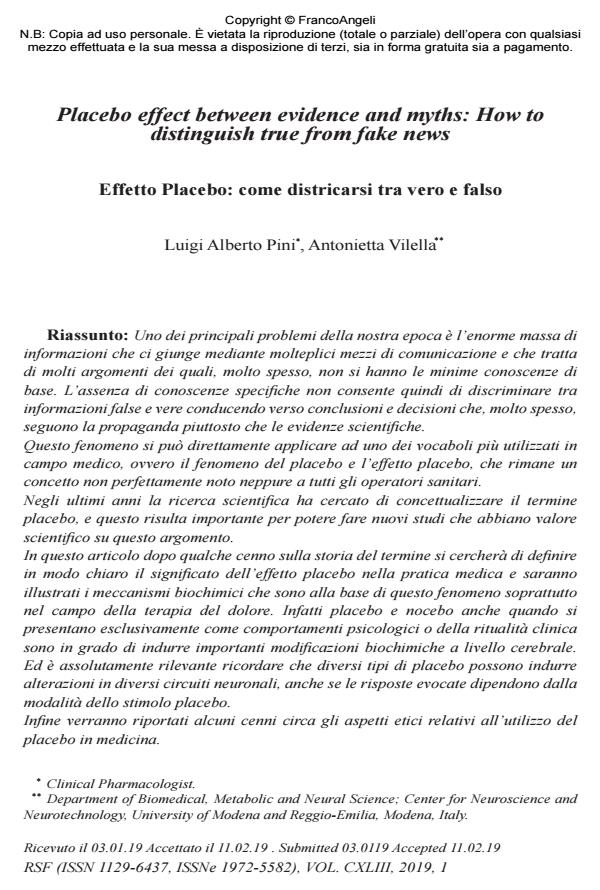Placebo effect between evidence and myths: How to distinguish true from fake news
Titolo Rivista RIVISTA SPERIMENTALE DI FRENIATRIA
Autori/Curatori Luigi Alberto Pini, Antonietta Vilella
Anno di pubblicazione 2019 Fascicolo 2019/1
Lingua Inglese Numero pagine 16 P. 131-146 Dimensione file 1831 KB
DOI 10.3280/RSF2019-001009
Il DOI è il codice a barre della proprietà intellettuale: per saperne di più
clicca qui
Qui sotto puoi vedere in anteprima la prima pagina di questo articolo.
Se questo articolo ti interessa, lo puoi acquistare (e scaricare in formato pdf) seguendo le facili indicazioni per acquistare il download credit. Acquista Download Credits per scaricare questo Articolo in formato PDF

FrancoAngeli è membro della Publishers International Linking Association, Inc (PILA), associazione indipendente e non profit per facilitare (attraverso i servizi tecnologici implementati da CrossRef.org) l’accesso degli studiosi ai contenuti digitali nelle pubblicazioni professionali e scientifiche.
One of the main problems in the present age is the enormous amount of information we have access to in every instant involving all types of questions, without having any direct experience on the topic. Therefore, in order to make appropriate choices it is important to discriminate between fake or scientifically proven news. This problem also applies to some of the most used words in medicine: placebo and placebo effect, which are not always fully understood by health professionals. In the past years a modern interpretation of placebo and its effects has become evident. This new interpretation is also important in order to make progress in the study of placebo. This mini-review will address the meaning and the use of the placebo effect in medical practice, and will deal with the biochemical mechanisms underlying the phenomenon mainly in the field of analgesia and pain perception. In fact, the placebo and nocebo effects, even when seen as psychological or ritual aspects of the therapeutic act, may change the biochemistry and the neuronal circuitry of the brain. Moreover, the mechanisms activated by placebos and nocebo have been found to be similar and often the same as those activated by drugs, whereas research has identified many types of responses emerging from different types of placebo. Finally, ethical problems arising from the use of placebo in medicine will be mentioned.
Uno dei principali problemi della nostra epoca è l’enorme massa di informazioni che ci giunge mediante molteplici mezzi di comunicazione e che tratta di molti argomenti dei quali, molto spesso, non si hanno le minime conoscenze di base. L’assenza di conoscenze specifiche non consente quindi di discriminare tra informazioni false e vere conducendo verso conclusioni e decisioni che, molto spesso, seguono la propaganda piuttosto che le evidenze scientifiche. Questo fenomeno si può direttamente applicare ad uno dei vocaboli più utilizzati in campo medico, ovvero il fenomeno del placebo e l’effetto placebo, che rimane un concetto non perfettamente noto neppure a tutti gli operatori sanitari. Negli ultimi anni la ricerca scientifica ha cercato di concettualizzare il termine placebo, e questo risulta importante per potere fare nuovi studi che abbiano valore scientifico su questo argomento. In questo articolo dopo qualche cenno sulla storia del termine si cercherà di definire in modo chiaro il significato dell’effetto placebo nella pratica medica e saranno illustrati i meccanismi biochimici che sono alla base di questo fenomeno soprattutto nel campo della terapia del dolore. Infatti placebo e nocebo anche quando si presentano esclusivamente come comportamenti psicologici o della ritualità clinica sono in grado di indurre importanti modificazioni biochimiche a livello cerebrale. Ed è assolutamente rilevante ricordare che diversi tipi di placebo possono indurre alterazioni in diversi circuiti neuronali, anche se le risposte evocate dipendono dalla modalità dello stimolo placebo. Infine verranno riportati alcuni cenni circa gli aspetti etici relativi all’utilizzo del placebo in medicina.
Parole chiave:Placebo, nocebo, miti e prove scientifiche.
Luigi Alberto Pini, Antonietta Vilella, Placebo effect between evidence and myths: How to distinguish true from fake news in "RIVISTA SPERIMENTALE DI FRENIATRIA" 1/2019, pp 131-146, DOI: 10.3280/RSF2019-001009